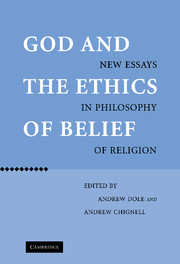Book contents
- Frontmatter
- Contents
- List of Contributors
- Acknowledgments
- The Ethics of Religious Belief: A Recent History
- PART ONE METAPHYSICS: GOD AND CREATURES
- PART TWO EPISTEMOLOGY: GOD AND THE ETHICS OF BELIEF
- 5 The Probability of the Resurrection
- 6 Is God an Unnecessary Hypothesis?
- 7 Direct Warrant Realism
- PART THREE SOCIAL-POLITICAL PHILOSOPHY: GOD, ETHICS, AND BELIEF
- Index
6 - Is God an Unnecessary Hypothesis?
Published online by Cambridge University Press: 25 July 2009
- Frontmatter
- Contents
- List of Contributors
- Acknowledgments
- The Ethics of Religious Belief: A Recent History
- PART ONE METAPHYSICS: GOD AND CREATURES
- PART TWO EPISTEMOLOGY: GOD AND THE ETHICS OF BELIEF
- 5 The Probability of the Resurrection
- 6 Is God an Unnecessary Hypothesis?
- 7 Direct Warrant Realism
- PART THREE SOCIAL-POLITICAL PHILOSOPHY: GOD, ETHICS, AND BELIEF
- Index
Summary
Summa theologiae, i, q.2, a.3 (the “five ways” article, the article whose topic is indicated by the heading “Whether God Exists”) begins with two “Objections.” Each of these objections is an argument. The first is a version of the argument from evil. The second is as follows:
Objection 2. It is, moreover, superfluous to suppose that what can be accounted for by a few principles has been produced by many. But it seems that everything we see in the world can be accounted for by other principles, without supposing God to exist. For all natural things can be accounted for by one principle, which is nature; and all voluntary things can be accounted for by one principle, which is human reason or will. Hence, there is no need to suppose that a God exists.
I will call this the superfluity argument. Here is a formulation of the essential point of the superfluity argument in language the modern mind may find more congenial than Thomas's talk of “principles”:
The only reason we could have for believing in God would be that it was necessary to postulate his existence to account for some observed fact or facts. But science can explain everything we observe, and its explanations do not appeal to God or to any other supernatural agency. Hence, there is no reason to believe that God exists. That is to say, the existence of God is an unnecessary hypothesis.
- Type
- Chapter
- Information
- God and the Ethics of BeliefNew Essays in Philosophy of Religion, pp. 131 - 149Publisher: Cambridge University PressPrint publication year: 2005
- 8
- Cited by



